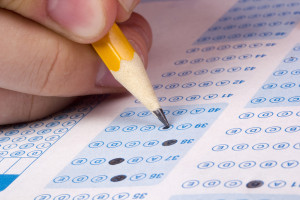To test or not to test? Florida school choice proponents split

By Mary C. Tillotson | Watchdog.org
While Florida’s Legislature considers expanding its tax-credit scholarship program, it’s unclear whether the expansion will include tighter standardized testing requirements for students receiving the freebies.
While Florida considers expanding its tax-credit scholarship program, school choice proponents debate whether scholarship recipients should be required to take state tests.
This year, 34,000 families had yet to complete the application when all the scholarships had been given out. Corporations can receive tax credits for donations made to Step Up for Students, a nonprofit that gives scholarships to low-income students who want an opportunity outside their traditional public school. The expansion would allow more families access to scholarships.
Senate President Don Gaetz said he supports the program, but that scholarship students should be required to take “valid and reliable assessments of their academic performance.”
Scholarship students are currently required to take some form of standardized test, but Gaetz said those tests don’t allow parents to assess how their children’s new private school is performing compared to their neighborhood public school.
In addition, he said, “the real value in testing is to provide diagnostic information so that teachers can customize instruction … and also to help taxpayers understand the value of what they’re paying for when taxpayers subsidize these scholarships in private schools.”
Not all school choice proponents support testing for scholarship students.
Most private and parochial schools already hold their students to rigorous standards and require some sort of testing, said Kara Kerwin, president of Center for Education Reform, and Jeff Reed, communications director for the Friedman Foundation for Educational Choice.
“They have options to use tests that match their school’s instructional styles and communities, so private schools, in a large part, are employing a testing regime. The concern with imposing a state test in private schools — with the imposition of the state test, strings are attached to that, and it’s those strings that will incentivize private schools to teach to the test, then all of a sudden the very things that made the private school successful are suddenly changed,” Reed said.
“It doesn’t give teachers freedom to give kids holistic education in the classroom and instruction based on what they’re seeing with diverse student bodies. We need more diversification, not more standardization.”
Because of this, many private schools may opt out of participating in the program entirely, Kerwin said. This results in fewer options for students.
“If they’re all of a sudden required to change everything and find a new way to test kids, think about the resources that would take for the school to do that,” she said.
Michael Brickman, national policy director at the Fordham Institute, said this wouldn’t necessarily be an issue.
“I wouldn’t assume that just because there’s a test, people are going to be teaching to the test,” he said. “You should be teaching to the standards and making sure students are ultimately getting an education with the goals set by the school or by the state or what have you.”
Testing is an important measure to assess student learning, he said.
“You want to make sure there’s a high quality assessment in place, and you want to make sure that there’s a good comparable measure to find out if students are learning,” Brickman said. “I think that there are different approaches. We put out a toolkit that suggested it should be the same test because it makes things easiest, but I wouldn’t say that’s necessarily doctrine.”
School choice itself is accountability, Reed said. He referred to More Than Scores, a study the Friedman Foundation published last fall, which found that test scores were near the bottom of parents’ priority list when they chose schools.
Parents care most about discipline, good learning environment, smaller class sizes, better safety and more individual attention, said Ben Scafidi, senior fellow with the Friedman Foundation and coauthor of the study.
Almost all parents said their decision “would” or “might” be impacted if a school didn’t provide them with the information they wanted, he said.
“Ultimately, the goal should be to have schools accountable to students and their needs, not a one-size-fits-all regulation by the government,” Reed said.
Instead public schools’ accountability measure – test scores – being imposed on private schools, public schools should open up to private schools’ accountability measure, he said: choice.
“Give all those parents the ability to leave,” he said. “We’re not saying they will leave, but when they have that option, that will provide a healthy incentive for every school to meet its customers’ needs. If your school’s as good as you say it is, prove it.”
Sen. Bill Galvano, sponsor of the tax-credit scholarship expansion bill, didn’t return calls for comment.
Contact Mary C. Tillotson at mtillotson@watchdog.org.
The post To test or not to test? Florida school choice proponents split appeared first on Watchdog.org.







